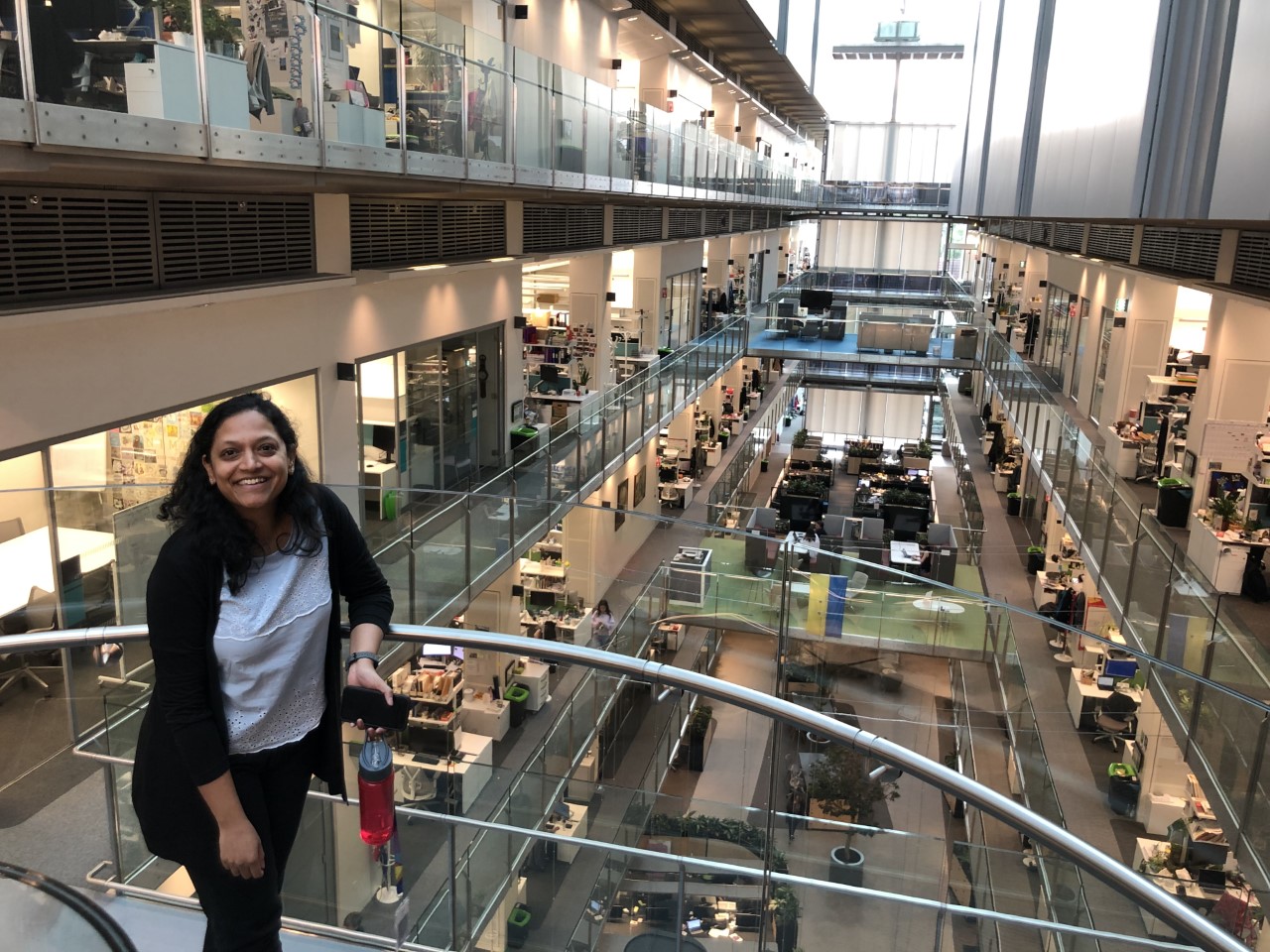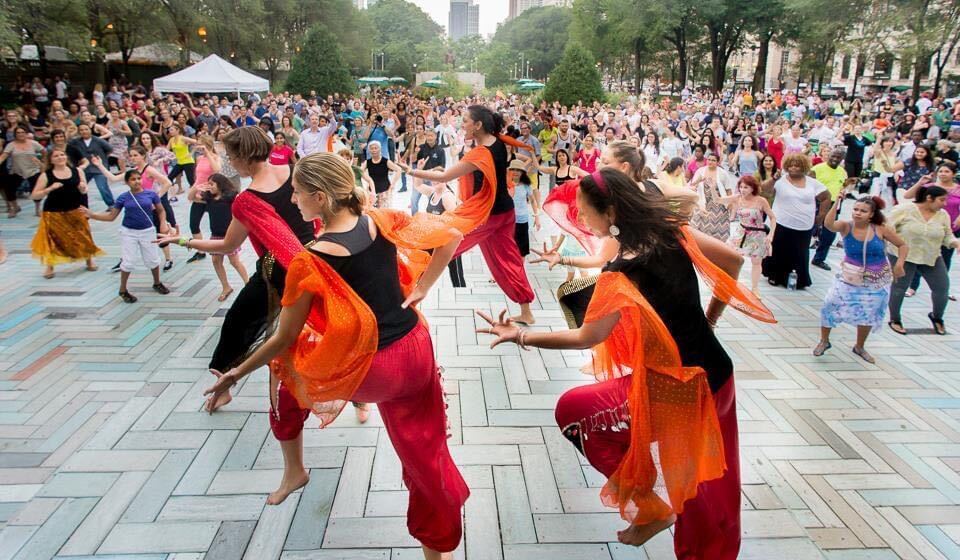Meet the preLighters: an interview with Angika Basant
12 October 2022
Angika Basant is a postdoctoral training fellow working in the lab of Michael Way at the Francis Crick Institute in London. She joined preLights back in 2018 and has been an invaluable member of its community. I had a lovely chat with her in the impressive Crick building during which we discussed the road that led her to London, the challenges along the way, her life as a postdoc, the role that preLights has played in it, as well as future goals and ambitions. Read all the way to the end for a fun fact about Angika that may come as a surprise…

“I had no idea that the working space would turn out so fancy.”
What sparked your initial interest in science?
I think it was a really good chemistry teacher who taught me in high school. What I remember most vividly is this simple experiment she showed us where you leave a salt solution overnight and create strikingly blue copper sulphate crystals the next day. To be honest, I know a lot of people say “when I was a kid, I used to pick up bugs” – but I was not into biology like that. I think I could have easily done a bachelors in history and have been equally happy. In the end, maybe what attracted me to science was looking at beautiful things, but in the beginning it was just because I enjoyed my Chemistry class.
“I know a lot of people say “when I was a kid, I used to pick up bugs” – but I was not into biology like that.”
So did this lead to an undergraduate degree in chemistry?
Indeed, it did. When I was doing my undergrad, I really enjoyed chemistry, but realised I enjoyed it even more in a biological context. So that’s why I decided to do a couple of internships at a biology lab in another city in India. At that time, I was really into biochemistry. My masters project involved NMR spectroscopy on malaria-infected mouse tissue. However, in this department there was a lot of cell biology research with lots of live imaging and that’s where I picked up an interest in cell biology.
How has this further developed – what are your current research interests?
My research interests have always been very broad. There are a lot of things that I find interesting, and sometimes it’s just a question of what I pick up – once I pick something up, I always end up enjoying it.
I do think there is quite a strong connection between my PhD and postdoc work. They both revolve around regulation of the cytoskeleton. In the context of my PhD, I studied how the C. elegans embryo regulates where to position its first division plane and now in my postdoc I look at how the Vaccinia virus gets actin to assemble – both are dependent on a functional cytoskeleton.
“…once I pick something up, I always end up enjoying it.”
How did you find your postdoc?
It was only after a very wide search. I went to eight labs in four countries. This was partly because my research interests were still very broad, but it was also a two-body problem: my husband and I were trying to decide on where to go. My current supervisor Michael Way and my PhD advisor knew each other from their time at EMBL. When I started reading about Michael’s work, I was just blown away by what viruses and bacteria can do. And the Crick Institute was just coming together at the time, so it was all very exciting. I interviewed in the old building actually, so I had no idea that the working space would turn out so fancy.
You mention the two-body problem – the challenge that partners face in obtaining jobs at the same university or within a reasonable commuting distance from each other – could you perhaps describe your situation?
My partner and I met while I was still in India. We were classmates: he was in the PhD programme, whereas I was in the master’s programme. I then went to Chicago for my PhD while he remained, which meant that we had a long-distance relationship for six years. We met only once a year.
When my partner finished his PhD, he looked for postdocs for a while without much luck, and then he chanced upon intellectual property law. In fact, he met some people who offered him an interesting position in a tech transfer office that was part of a university in India. And then when I moved to London for my postdoc, he came with me and found a job at a law firm here. Now he is a qualified European patent attorney. So things turned out really well for us.
That’s wonderful – so could you perhaps tell us a bit more about the experience of moving from Delhi > Mumbai > Chicago > London?
The challenge was mostly cultural, though when you’re moving between research labs, I haven’t found that there are too many insurmountable differences. The real adjustment is being far from home or living on your own. If you find a good cohort of people though, then I think it’s okay.
I have found that the way in which science is done is different in all the three countries that I’ve worked in. I would say that in the US, ‘workism’ is like a religion. In the UK, or maybe generally in Europe, having a proper work-life balance is a bit more appreciated or respected. Taking a long holiday every now and then is considered a good thing in the UK, whereas it was not the norm in the US. The big difference in India, depending on which Institute you work in, is just the pace at which things might go – like if you’re going to order something, it’s not going to come tomorrow necessarily.
“The real adjustment is being far from home or living on your own. If you find a good cohort of people though, then I think it’s okay.”
Could you tell us a bit more about your life as a postdoc?
Doing a postdoc has been the most stressful phase in my life so far – not because I haven’t been happy in the lab or something, but because of the expectations and uncertain outcome. The expectations of you (or those that you have of yourself) are greater than what they are for a PhD student. You have to be a lot more independent and there’s no obvious endpoint, like completing a PhD degree. Also, being part of a PhD programme can be easier because you’re with a group of people who are experiencing the same thing. In a postdoc, you really have to find people who are in a similar situation as you. So the Crick is a really big institute, and it hosts, I think, around 400 postdocs. Still, I would say that you need to be lucky to find people who are experiencing the same things at roughly the same time as you.
In that regard has joining preLights helped you to build a network?
It definitely has. I’ve gotten to know lots of people in different parts of the world – also through virtual events – and people who are in similar career stages. It’s been really helpful in many situations – for example, when I needed to apply for a grant, there were always people who I could contact for some help and advice.
“ [Through preLights] I’ve gotten to know lots of people in different parts of the world – also through virtual events – and people who are in similar career stages.”
I’ve noticed that (almost) all your preLights posts include comments from the authors – what’s your secret?
I try to find something about that group of authors that is unique and look for connections to them. Sometimes I even include something about my own work (also previous work!) to highlight this connection to work of the preprint authors. In any case, I try to make the opening sentence of my email as engaging as possible. That’s generally my tactic. Also, I’m very persistent (but polite!) – if I don’t get a response, I will follow up. To be honest, there were only a few people I had to chase.
So could you maybe talk a little about your motivation and enthusiasm for getting involved with science communication (/outreach) work?
So besides preLights, I haven’t done much else during my postdoc. However, during my masters and PhD I was involved in a lot of public outreach events; for example, during my masters, the Institute I worked at used to organise an Open Day that hundreds of kids would attend. I remember talking to these kids when it was the 200th birth anniversary of Darwin. I gave a talk about how much evolution has not changed us – so how much we have in common with, let’s say, a frog. During my PhD, I led a demonstration of C. elegans microscopy to show high school kids just how beautiful nature is and how we can use these model organisms in research. So that was all really, really fun – I would love to keep doing stuff like that!
“…during my masters and PhD I was involved in a lot of public outreach events … I would love to keep doing stuff like that!”
What are your future plans? And what are the lessons you’ve learned from previous experiences that you will take into a new job?
I’m actually applying for (junior-) PI positions, also in India. I would like to go back, if I find a good position. But it’s very competitive! Lots of people have, like me, gone abroad to train and would now like to go back. Plus, there are only a handful of places that are well-funded. If I do land a PI position, I’m going to start from my current interests, but also try to expand on this by (for example) bringing C. elegans genetics in the picture.
One thing I’ve learned is how every PI must appreciate and tailor the way that they are depending on each individual member of the group – and that is a real skill! Earlier this year, I completed an EMBO leadership programme to help with this. Generally speaking, I think my interpersonal and social skills are reasonably good, so I should be able to gauge what people are feeling or needing. Hopefully I won’t lose that.
So lastly, could you tell us something that people might not know about you?
I used to be a Bollywood dance instructor. For 4 years I worked with a dance company in Chicago, choreographed songs and taught two cardio-dance classes a week.











